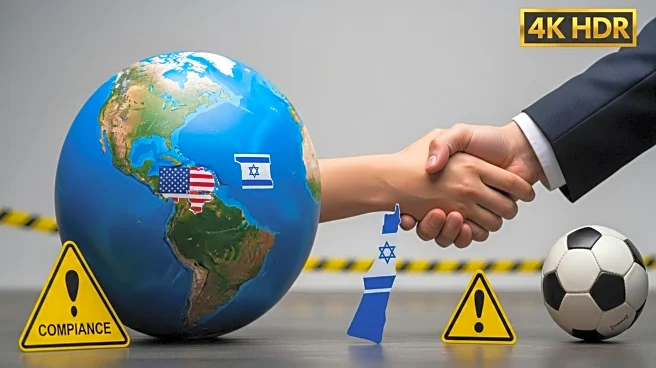What's Happening?
The U.S. State Department has appointed a dedicated official to manage the case of Mohammed Ibrahim, a 16-year-old American-Palestinian citizen detained in an Israeli military prison for over seven months. Ibrahim, who was arrested at age 15 from his family's home in the West Bank, is accused by Israeli authorities of throwing rocks at Israeli vehicles. His detention has sparked diplomatic efforts, with his family campaigning for his release and engaging in high-profile meetings with U.S. lawmakers. The case has garnered attention from Florida lawmakers, including Kathy Castor, and over 100 civil rights and faith-based organizations have signed a letter demanding his release and U.S. government intervention. The State Department has stated it provides consular assistance to all citizens detained abroad but has refrained from further comment due to privacy considerations.
Why It's Important?
The appointment of a State Department official to handle Ibrahim's case underscores the diplomatic tensions between the U.S. and Israel regarding the treatment of American citizens detained abroad. This development highlights the broader issue of human rights and the U.S. government's role in advocating for its citizens. The involvement of lawmakers and civil rights organizations reflects the growing concern over the treatment of Palestinians and the impact of Israeli policies on U.S. citizens. The case could influence U.S.-Israel relations, particularly in terms of diplomatic negotiations and human rights advocacy.
What's Next?
Ibrahim is scheduled to meet with the newly appointed State Department official next week, which may lead to increased diplomatic efforts for his release. The involvement of U.S. lawmakers, such as Senators Jeff Merkley and Chris Van Hollen, who have expressed concern over Ibrahim's imprisonment, could result in further political pressure on Israel. The ongoing advocacy by civil rights organizations may continue to draw public attention and potentially influence U.S. foreign policy decisions regarding Israel.
Beyond the Headlines
The case of Mohammed Ibrahim highlights the ethical and legal challenges faced by dual citizens in conflict zones. It raises questions about the adequacy of international legal protections for minors and the responsibilities of governments to ensure humane treatment and fair trials for detained individuals. The situation also reflects the broader cultural and political dynamics between the U.S. and Israel, particularly concerning human rights and diplomatic relations.








